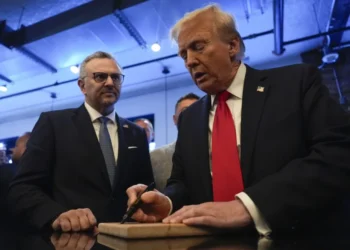The recent tour of Chinese Foreign Minister Wang Yi across Namibia, the Republic of the Congo, Nigeria, and Chad has spotlighted the deepening partnership between China and Africa.
This visit underscores China’s commitment to addressing Africa’s pressing challenges through a multifaceted approach that includes infrastructure development, poverty alleviation, and sustainable growth.
With a substantial $51 billion investment strategy aimed at key sectors such as technology and renewable energy, China seeks to bolster mutual growth while consolidating its influence in a region of strategic importance.
In an exclusive interview with the Vaultz News, Dr. Chipo Dendere, a political scientist, sheds light on the unique dynamics of this relationship. According to her, China’s approach to foreign aid in Africa is markedly different from that of Western nations.
“China’s non-interference policy allows African countries to pursue their development agendas without external pressures related to governance or human rights. This contrasts sharply with Western nations, which often impose conditions tied to aid.”
Dr. Chipo Dendere
However, this seemingly liberating approach is not without its pitfalls. She stated that the absence of conditionality could foster dependency on Chinese investments, raising concerns about neocolonialism and the erosion of governance integrity.
The Forum on China-Africa Cooperation (FOCAC) has been a cornerstone of this partnership, offering a platform for dialogue and collaboration. Dr. Dendere emphasized the need for FOCAC to evolve to address African aspirations better.
“To truly serve African nations, FOCAC must enhance local engagement and prioritize participatory mechanisms,” she said. “This would ensure that projects are tailored to the specific needs of each country rather than adopting a one-size-fits-all approach.”
By focusing on sectors such as education, healthcare, and technology transfer, FOCAC could create sustainable growth models that transcend financial transactions, fostering genuine development, she noted.
The Debt Dilemma and Economic Dependency
China’s massive investments in Africa come with risks, particularly concerning debt sustainability. Many African nations have taken on significant loans for infrastructure projects under favorable terms from Chinese lenders.
While these investments promise economic growth, the long-term implications are less certain. “Instances of debt-trap diplomacy have raised alarms,” Dr. Dendere warned.
“Countries unable to meet repayment obligations risk losing strategic assets or falling under increased political influence from Beijing. Moreover, the preference for Chinese firms in infrastructure projects often sidelines local businesses, potentially stifling domestic economic development.”
Dr. Chipo Dendere
This dual-edged sword highlights the need for careful management of investment terms and a focus on building local capacity to ensure that Africa benefits equitably from these partnerships.

Leveraging Technology for Sustainable Development
Amid the challenges, opportunities abound for African nations to leverage their relationship with China to enhance technological capabilities and promote sustainable development.
Collaborative initiatives, such as the China-Africa Science and Technology Partnership Plan, exemplify the potential for joint research and training programs to build local expertise.
“By engaging with Chinese firms specializing in advanced technologies, African countries can modernize their economies and gain access to critical skills,” Dr. Dendere said. Renewable energy projects, in particular, offer a pathway to sustainable growth. These initiatives not only address energy deficits but also create jobs and foster entrepreneurship within African borders.
China’s expanding footprint in Africa is reshaping global geopolitics, particularly in its relationships with major powers such as the United States and Europe. As China deepens its investments, Western nations are re-evaluating their engagement strategies to counterbalance Beijing’s influence.
“This competitive dynamic could benefit African nations,” Dr. Dendere said. “By leveraging their strategic importance in global supply chains, African countries can negotiate better terms and diversify their partnerships.”
However, this competition also underscores the need for African nations to assert their agency in these relationships.
“The continent must prioritize its own development goals and demand equitable terms from all partners. Whether engaging with China, the U.S., or Europe, the focus should be on fostering sustainable growth and enhancing local capacities.”
Dr. Chipo Dendere
Dr. Dendere’s insights underscored a critical point, “China’s relationship with Africa is a double-edged sword.” She added: “While it offers unparalleled opportunities for growth and modernization, it also demands vigilance and strategic planning from African nations to ensure that these benefits are realized sustainably and equitably.”
As China and Africa navigate this complex relationship, the potential for mutual benefits remains significant. However, the risks of dependency, governance challenges, and geopolitical tensions cannot be ignored.
READ ALSO: Ablakwa Slams Minority for Criticizing Team O.R.A.L.





















